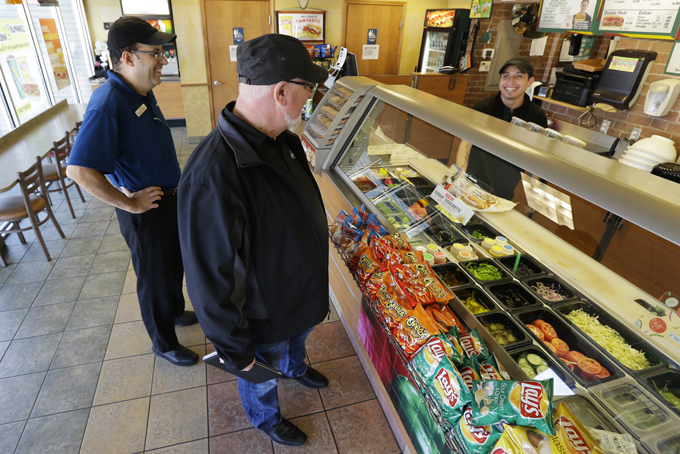
SEATTLE (AP) — A federal judge is considering whether he should block part of Seattle’s new minimum wage law before it takes effect next month, on the grounds that it discriminates against franchises that are part of large national chains.
The law, which raises the city’s minimum wage to $15 an hour, is phased in more quickly for big companies than small ones. Among those determined to be big companies as part of the law are franchises — from fast-food joints to hotel chains — that are connected to networks that in all have more than 500 workers.
Paul Clement, a former U.S. solicitor general who is representing the International Franchise Association and five franchises in Seattle, told Judge Richard A. Jones during arguments Tuesday that’s unfair. They’re essentially small businesses, he said, but by 2017 they’ll have to pay their workers a minimum wage $4 higher than their purely local competitors.
That punishes those companies for their involvement in interstate commerce, he said — a violation of the Constitution’s Commerce Clause, which reserves the regulation of interstate commerce to the federal government.
“‘Buy Local’ as a city policy is 100 percent prohibited by the Commerce Clause,” he said.
Assistant city attorney Greg Narver responded that the law’s intent was simply to raise the pay of Seattle’s low-wage workers, and that the City Council wanted to draw the line somewhere as far as which businesses could afford to pay the higher wage when. Because franchises receive benefits from their association with their chains — pervasive national marketing, business plans, training and product development — it was perfectly reasonable for the city to treat them differently, he said.
“It’s part of the decision making: Who’s big and who’s small,” Narver said. “It’s not the role of the courts to second-guess the legislative judgments.”
Seattle’s law gives businesses with more than 500 employees nationally at least three years to phase in the increase — four if they provide health insurance. Smaller employers get seven years.
On April 1, the large businesses and national chains must raise their pay to at least $11; smaller ones to at least $10. Some franchise owners, including David Jones, who owns two Subway sandwich shops in town, say they’ll need to raise prices to cover the first increase.
The city has stressed that the law is not discriminatory on its face: It applies to any business that is part of a network of at least 500 employees, whether that chain is an interstate behemoth or a chain located entirely in Washington state. But Clement argued that it is discriminatory in its effect, because 96 percent of the franchises that would be subject to the quicker $15-an-hour phase-in are part of national chains.
He also pointed to emails from Nick Hanauer, a prominent Seattle entrepreneur who served on an advisory committee looking at the minimum wage proposal, as evidence of the city’s intent to discriminate against interstate franchises. Hanauer referred to “extractive national chains” as “civically corrosive,” and suggested they should be considered large businesses for purposes of the law.
The judge seemed dismissive. He noted that Hanauer was just one of 24 members of the committee and questioned whether there was any evidence the city adopted his views about big chains. He also grilled Clement about whether the city’s intent would even matter in the absence of a discriminatory effect, asking whether he had case law to support his position or whether it was just so much “creative spin.”
The franchises are seeking a preliminary injunction that would block the relevant part of the law from taking effect April 1, pending a ruling from Jones expected later this year on the full merits of the case. Jones said he would do his best to decide by next Tuesday whether to grant the injunction.
___
Follow Johnson at https://twitter.com/GeneAPseattle
Copyright 2015 The Associated Press. All rights reserved. This material may not be published, broadcast, rewritten or redistributed.
